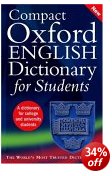dictionary + writing and study skills
Despite record-breaking results in GCSEs and A levels, many employers, colleges, and universities complain that they have applications from people who cannot spell or write good English. This is not to say that ‘standards are falling’ – which I don’t believe. On the contrary it seems to me that standards are actually rising – because we are surrounded in print, on screen, and everywhere else by high-quality writing. But more employers and teachers now expect people to be able to produce similarly clear prose, free from ambiguity and grammatical errors.
 So Oxford University Press have come up with a brand-new dictionary to help students in colleges and universities not only grasp the meanings and spellings of words, but to understand their origins. With over 144,000 words, phrases, and definitions, it offers comprehensive coverage of current English and is perfect for student reference and everyday study needs. They have also done their best to reduce the normally intimidating appearance of pages in a dense book of reference. Each headword is printed in blue instead of the usual black, and this gives the page a lighter tone. It makes the twelve hundred page book (not so compact!) much easier to use.
So Oxford University Press have come up with a brand-new dictionary to help students in colleges and universities not only grasp the meanings and spellings of words, but to understand their origins. With over 144,000 words, phrases, and definitions, it offers comprehensive coverage of current English and is perfect for student reference and everyday study needs. They have also done their best to reduce the normally intimidating appearance of pages in a dense book of reference. Each headword is printed in blue instead of the usual black, and this gives the page a lighter tone. It makes the twelve hundred page book (not so compact!) much easier to use.
The really big bonus however is an additional central section which explains how to brush up your English, and how to produce essays and dissertations. It also covers reports and summaries, advice on note-taking and referencing, and preparing CVs and job applications.
Throughout the text there are also notes giving advice on the use of good English, and highlighting the differences between commonly confused words such as empathy and sympathy, and affect and effect, as well as thousands of example phrases showing words in context.
There are also boxed explanations of common problems and misunderstandings. So – the entry on forbear runs as follows:
forbear1 /for-bair / verb (past forebore; past. part. forborne) stop oneself from doing something. – ORIGIN Old English.
USAGE Do not confuse forbear with forebear. Forbear means ‘stop oneself from doing something’ (he doesn’t forbear to write about the bad times ) while forebear (which is also sometimes spelled forbear) means ‘an ancestor’ (our Stone Age forebears).
There is guidance provided on which verbal register a word belongs to – that is, if it’s formal or informal, dated (rotter) literary, technical (dorsal), derogatory (bimbo), offensive, or euphemistic (powder room).
If you were just embarking on a course at college or university, this would be a very good investment. It’s comprehensive, completely up to date, and with Amazon’s discount, a bargain at the price.
© Roy Johnson 2006
Compact Oxford English Dictionary for Students, Oxford: Oxford University Press, 2006, pp.1210, ISBN: 0199296251
More on dictionaries
More on language
More on literary studies
More on grammar